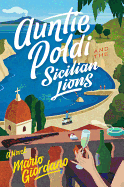
Mario Giordano's first novel to be translated into English, Auntie Poldi and the Sicilian Lions, is a charming-with-a-bite mystery starring Isolde Poldina Oberreiter, aka Auntie Poldi, a sensual woman of a certain age. Usually in mysteries, older women are clever, wise or crotchety, rarely lusty. Poldi is all that, and more. Although booze and depression have taken their toll, she is still glamorous and stylish, and never without her black wig.
On her 60th birthday, Auntie Poldi moved from Munich to Sicily, "intending to drink herself comfortably to death with a sea view... [but] Sicily is complicated--you can't simply die there; something always gets in the way." She wanted to be near family: three sisters-in-law--Teresa, Caterina and Luisa--and Uncle Martino, Teresa's husband. She finds a house in Torre Archirafi, a sleepy little town between Catania and Taormina, with the sea below and Etna behind. It's crowded on summer weekends with Catanians "dazed by a miasma of coconut oil, frying fat and fatalism," but Poldi settled in at No. 29 Via Baronessa, where her days begin with a revivifying Prosecco, followed by an espresso with brandy, followed by brandy, then by her first beer; later in the day, gin and tonic. She was well on her way to dying--until she hired a young, handsome handyman, Valentino.
Soon after he began working for her, he vanished. Auntie Poldi decides to find him after not hearing from him for a few days, and becomes suspicious when she can't get any information from the village or his parents. Although she is still determined to go down the slow suicide road, she wants answers. After all, her father had been a homicide detective in Augsburg, so Poldi was preprogrammed for suspicion and the hunting instinct.
Once a month, her somewhat hapless nephew from Germany comes to stay in Poldi's attic while working on an epic family saga. In the evenings, if she is tipsy enough (a given), he hears about her investigations into Valentino's disappearance, and narrates the story with various comments and asides.
Auntie Poldi finds Valentino's body at the local beach, his head blown away. After calling the police, she meets Vito Montana, a detective chief inspector with a face like a Greek god. Poldi chats him up, offering her take on the evidence (no saltwater marks on his clothing). Smitten with the sexy detective, she tells her nephew she "had to lay a little scent mark, and nothing is more appealing to a detective than a mixture of half-truths and subtle eroticism."
She begins to unravel the mystery when she finds out about the commonplace theft of tiles, mosaics and sculptures from old palaces and country mansions--they are sold to people who want to outfit their expensive new houses. Poldi finds inspiration and clues on a mushroom-hunting expedition, in her photos of Taormina, with a missing stone lion that ends up on her roof. They sometimes lead her down the wrong path, but she perseveres. Poldi is also energized by her need to be one step ahead of Montana and, after she discovers another woman in his life, to make him look like a fool. "The ice cubes tinkled their serenade of coolness and refreshment, the scent of juniper hummed its promise of farewell and oblivion, the tonic promised tears and bitterness, the sun went down behind Etna, and the sea was as heart-rendingly blue as Poldi planned to be before long." However, she isn't blue for long, and sets a trap for Valentino's murderer; of course, things don't go as planned.
Auntie Poldi is enchanting and formidable. Melancholy often overtakes her, but she has a restlessness that has dominated her family for centuries, "arising whenever the wind changed--whenever the world went awry and called for adjustment and correction." In spite of her melancholy and depression, and desire to drink herself into oblivion, Poldi knows a thing or two about "starting afresh, picking yourself up, laughing at yourself and standing for no nonsense." And, when the chips are down, showing plenty of cleavage.
In addition to creating a delightful character, Mario Giordano treats the reader to a primer on Sicily. "For Sicilians, joie de vivre rests on two pillars: good food and talking/arguing about good food.... Life is complicated on an island imprisoned in a stranglehold of crisis and corruption, where men still live with their parents until marriage or their mid-forties for lack of employment, but no culinary compromises are ever made." Sicilian cuisine is "all-embracing and pleasurably involves all the senses in a single dish. [The pistachio ice cream was] salty as sea air, the chocolate ice cream faintly bitter and a little tart like a lover's goodbye the next morning."
Giodano has a knack for description--a Frenchwoman, Valerie, is "every chain-smoking French film director's dream"--and for fancy. Death visits Auntie Poldi with a clipboard and a to-do list, but tells her that, against her wishes, he hasn't come for her yet. Inspector Chance, who's always needed at some stage in crime solving, does minimal work, is a capricious slob, but he can shine a light on hidden mysteries. In this case, Inspector Chance brings together Poldi, a photograph and Ringo Starr.
Giordano's prose is witty and lush, and sometimes overblown to match Poldi: "the argosy of their passion finally departed under full sail." Auntie Poldi and the Sicilian Lions is absolutely enchanting, combining whimsy, mystery, sorrow and Sicilian hot blood, with a lusty, tart heroine who "[knows] a thing or two about good places, friendship and things that sustain us." --Marilyn Dahl

